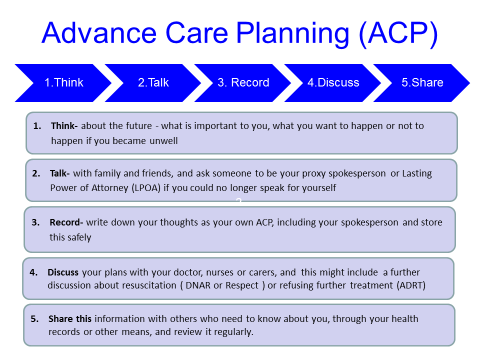Advance Care Planning
What is it?
Advance care planning is a voluntary process of person-centred conversation between a person and their care providers on their preferences and goals for their future care or medical treatment. These tend to carry for several talks over time with anybody the person wants involved. This process typically involves discussions about values, beliefs, and goals for future healthcare decisions
People are able to discuss the type of care they would like to receive at the end of their life during the ACP, for instance they can:

- Make a decision about where they would prefer to be cared for or where they would wish to pass away.
- Share their preferences regarding the manner in which they would like to carry out activities, such as having a shower or bath.
- Discuss any dietary restrictions or preferences you may have.
- Delegate the responsibility of speaking on their behalf to a proxy spokesperson or a Lasting Power of Attorney.
Who can undertake an ACP?
These are important for individuals planning for future care or at danger of mental incapacity, including:
- Individuals suffering worsening health owing to long-term ailments or life-limiting illnesses, such as dementia, frailty, kidney, heart, or liver failure, lung disease, neurological problems, or incurable cancer.• Declining functional status, increased sickness burden, or chronic physical/mental health issues
- Patients experiencing significant health and care transitions, such as multiple hospital admissions, shifts in treatment focus, or moving into a care home.
- Patients undergoing major surgeries or high-risk treatments, such as bone marrow transplants.
- Patients with acute life-threatening conditions that may not be fully reversible.
What are benefits to undertaking an ACP?
For the person:
• They may contemplate, investigate, and share who and what matters most important to them and how it would alter if they were sick. Many feel more confident and in charge of their life after using this.
• Individuals should receive care and treatment that aligns with their values, particularly near the end of life. Collaborating with palliative care and linking individuals to necessary services can help them live well for as long as feasible.
• The person can identify ineffective medical interventions based on their unique circumstances.
• Individuals can feel sure that their priorities will be considered in treatment decisions in emergencies or when they cannot fully participate in decision-making.
Families, caregivers, and loved ones:
• Families, caretakers, and loved ones will feel more reassured when the person has ownership of the process and can express their priorities while having capacity.
• Early exploration of needs and preferences reduces the need for family, caregivers, and others to make decisions on behalf of the person.
How can Farrell Healthcare help you or your loved one with advanced care planning in the community?
By undertaking an advanced care plan with us or letting us be part one you are already conducting, even if you are a current client, will help to play a vital role in helping yourself and their loved ones navigate the complexities of healthcare decision-making. By offering comprehensive assessments, facilitating discussions, developing advanced care plans, ensuring documentation is accessible, providing training and education, facilitating communication, and supporting decision-making. Please give click here to get in contact with us today to discuss how we can help you take control of your healthcare choice and ensure your wishes are respected and honoured.
Further Guidance
For a quick guide on advance care planning, give this video a watch from the Gold Standard Framework. If you would like a more in depth guide please click here to access the NHS guidance for Universal Principles for Advance Care Planning.


Recent Comments